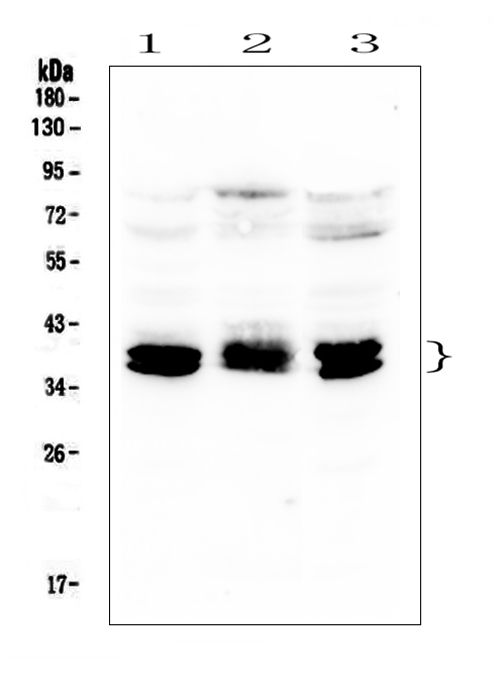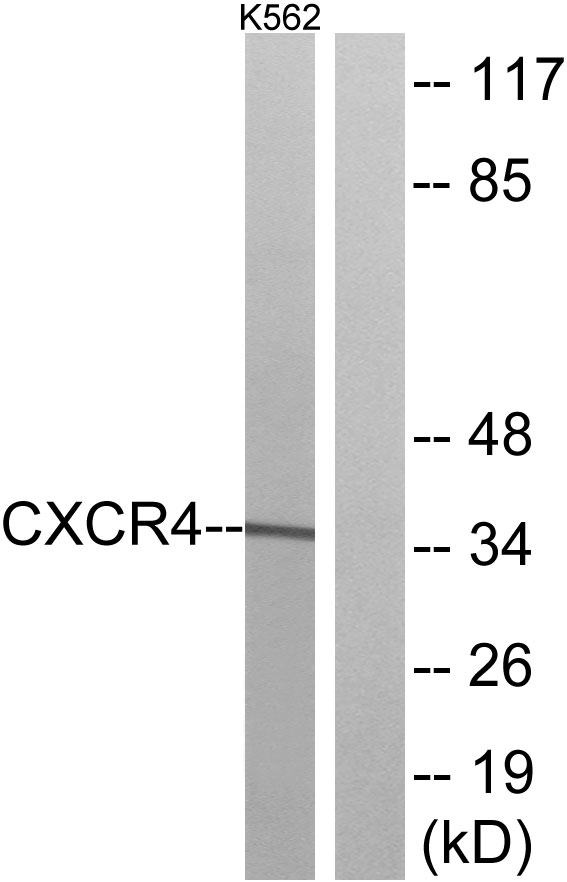![Non-transfected (–) and transfected (+) boiled and unboiled 293T whole cell extracts (30 μg) were separated by 10% SDS-PAGE, and the membrane was blotted with CXCR4 antibody [HL2612] (GTX639064) diluted at 1:1000. The HRP-conjugated anti-rabbit IgG antibody (GTX213110-01) was used to detect the primary antibody. Non-transfected (–) and transfected (+) boiled and unboiled 293T whole cell extracts (30 μg) were separated by 10% SDS-PAGE, and the membrane was blotted with CXCR4 antibody [HL2612] (GTX639064) diluted at 1:1000. The HRP-conjugated anti-rabbit IgG antibody (GTX213110-01) was used to detect the primary antibody.](https://www.genetex.com/upload/website/prouct_img/normal/GTX639064/GTX639064_T-45166_20230929_WB_B_23100319_579.webp)
Non-transfected (–) and transfected (+) boiled and unboiled 293T whole cell extracts (30 μg) were separated by 10% SDS-PAGE, and the membrane was blotted with CXCR4 antibody [HL2612] (GTX639064) diluted at 1:1000. The HRP-conjugated anti-rabbit IgG antibody (GTX213110-01) was used to detect the primary antibody.
CXCR4 antibody [HL2612]
GTX639064
ApplicationsImmunoFluorescence, Western Blot, ImmunoCytoChemistry
Product group Antibodies
ReactivityCanine, Human, Mouse
TargetCXCR4
Overview
- SupplierGeneTex
- Product NameCXCR4 antibody [HL2612]
- Delivery Days Customer9
- Application Supplier NoteWB: 1:500-1:3000. *Optimal dilutions/concentrations should be determined by the researcher.Not tested in other applications.
- ApplicationsImmunoFluorescence, Western Blot, ImmunoCytoChemistry
- CertificationResearch Use Only
- ClonalityMonoclonal
- Clone IDHL2612
- Concentration1 mg/ml
- ConjugateUnconjugated
- Gene ID7852
- Target nameCXCR4
- Target descriptionC-X-C motif chemokine receptor 4
- Target synonymsCD184, D2S201E, FB22, HM89, HSY3RR, LAP-3, LAP3, LCR1, LESTR, NPY3R, NPYR, NPYRL, NPYY3R, WHIM, WHIMS, WHIMS1, C-X-C chemokine receptor type 4, CD184 antigen, LPS-associated protein 3, SDF-1 receptor, chemokine (C-X-C motif) receptor 4, fusin, leukocyte-derived seven transmembrane domain receptor, lipopolysaccharide-associated protein 3, neuropeptide Y receptor Y3, neuropeptide Y3 receptor, seven transmembrane helix receptor, seven-transmembrane-segment receptor, spleen, stromal cell-derived factor 1 receptor
- HostRabbit
- IsotypeIgG
- Protein IDP61073
- Protein NameC-X-C chemokine receptor type 4
- Scientific DescriptionThis gene encodes a CXC chemokine receptor specific for stromal cell-derived factor-1. The protein has 7 transmembrane regions and is located on the cell surface. It acts with the CD4 protein to support HIV entry into cells and is also highly expressed in breast cancer cells. Mutations in this gene have been associated with WHIM (warts, hypogammaglobulinemia, infections, and myelokathexis) syndrome. Alternate transcriptional splice variants, encoding different isoforms, have been characterized. [provided by RefSeq, Jul 2008]
- ReactivityCanine, Human, Mouse
- Storage Instruction-20°C or -80°C,2°C to 8°C
- UNSPSC41116161

![Non-transfected (–) and transfected (+) Jurkat whole cell extracts (30 μg) were separated by 10% SDS-PAGE, and the membrane was blotted with CXCR4 antibody [HL2612] (GTX639064) diluted at 1:1000. The HRP-conjugated anti-rabbit IgG antibody (GTX213110-01) was used to detect the primary antibody. Non-transfected (–) and transfected (+) Jurkat whole cell extracts (30 μg) were separated by 10% SDS-PAGE, and the membrane was blotted with CXCR4 antibody [HL2612] (GTX639064) diluted at 1:1000. The HRP-conjugated anti-rabbit IgG antibody (GTX213110-01) was used to detect the primary antibody.](https://www.genetex.com/upload/website/prouct_img/normal/GTX639064/GTX639064_T-45166_20230929_WB_shRNA_watermark_23100319_369.webp)
![Various tissue extracts (50 μg) were separated by 10% SDS-PAGE, and the membrane was blotted with CXCR4 antibody [HL2612] (GTX639064) diluted at 1:1000. The HRP-conjugated anti-rabbit IgG antibody (GTX213110-01) was used to detect the primary antibody, and the signal was developed with Trident femto Western HRP Substrate. Various tissue extracts (50 μg) were separated by 10% SDS-PAGE, and the membrane was blotted with CXCR4 antibody [HL2612] (GTX639064) diluted at 1:1000. The HRP-conjugated anti-rabbit IgG antibody (GTX213110-01) was used to detect the primary antibody, and the signal was developed with Trident femto Western HRP Substrate.](https://www.genetex.com/upload/website/prouct_img/normal/GTX639064/GTX639064_T-45166_20230929_WB_M_tissue_23100319_866.webp)
![Boiled and unboiled Jurkat whole cell and membrane extracts (30 μg) were separated by 10% SDS-PAGE, and the membrane was blotted with CXCR4 antibody [HL2612] (GTX639064) diluted at 1:1000. The HRP-conjugated anti-rabbit IgG antibody (GTX213110-01) was used to detect the primary antibody. Boiled and unboiled Jurkat whole cell and membrane extracts (30 μg) were separated by 10% SDS-PAGE, and the membrane was blotted with CXCR4 antibody [HL2612] (GTX639064) diluted at 1:1000. The HRP-conjugated anti-rabbit IgG antibody (GTX213110-01) was used to detect the primary antibody.](https://www.genetex.com/upload/website/prouct_img/normal/GTX639064/GTX639064_45243_20231201_WB_Fraction_23120519_647.webp)
![Whole cell extract (30 μg) was separated by 10% SDS-PAGE, and the membrane was blotted with CXCR4 antibody [HL2612] (GTX639064) diluted at 1:1000. The HRP-conjugated anti-rabbit IgG antibody (GTX213110-01) was used to detect the primary antibody. Whole cell extract (30 μg) was separated by 10% SDS-PAGE, and the membrane was blotted with CXCR4 antibody [HL2612] (GTX639064) diluted at 1:1000. The HRP-conjugated anti-rabbit IgG antibody (GTX213110-01) was used to detect the primary antibody.](https://www.genetex.com/upload/website/prouct_img/normal/GTX639064/GTX639064_45243_20240119_WB_D_24012217_706.webp)
![CXCR4 antibody [HL2612] detects CXCR4 protein at cell membrane by immunofluorescent analysis. Sample: Jurkat cells were fixed in 4% paraformaldehyde at RT for 15 min. Green: CXCR4 stained by CXCR4 antibody [HL2612] (GTX639064) diluted at 1:500. Blue: Fluoroshield with DAPI (GTX30920). CXCR4 antibody [HL2612] detects CXCR4 protein at cell membrane by immunofluorescent analysis. Sample: Jurkat cells were fixed in 4% paraformaldehyde at RT for 15 min. Green: CXCR4 stained by CXCR4 antibody [HL2612] (GTX639064) diluted at 1:500. Blue: Fluoroshield with DAPI (GTX30920).](https://www.genetex.com/upload/website/prouct_img/normal/GTX639064/GTX639064_T-45166_20240112_ICC_IF_24013018_143.webp)
![CXCR4 antibody [HL2612] detects CXCR4 protein by immunofluorescent analysis. Sample: Mock and transfected 293T cells were fixed in ice-cold MeOH for 5 min. Green: CXCR4 stained by CXCR4 antibody [HL2612] (GTX639064) diluted at 1:500 and competitor's antibody (highly cited competitor) diluted at 1:500. Blue: Fluoroshield with DAPI (GTX30920). *Competitor's antibody is not affiliated with GeneTex and does not endorse this product. CXCR4 antibody [HL2612] detects CXCR4 protein by immunofluorescent analysis. Sample: Mock and transfected 293T cells were fixed in ice-cold MeOH for 5 min. Green: CXCR4 stained by CXCR4 antibody [HL2612] (GTX639064) diluted at 1:500 and competitor's antibody (highly cited competitor) diluted at 1:500. Blue: Fluoroshield with DAPI (GTX30920). *Competitor's antibody is not affiliated with GeneTex and does not endorse this product.](https://www.genetex.com/upload/website/prouct_img/normal/GTX639064/GTX639064_45243_20240719_ICC_IF_competitor_B_24080622_407.webp)
![Non-transfected (–) and transfected (+) boiled and unboiled 293T whole cell extracts (30 μg) were separated by 10% SDS-PAGE, and the membranes were blotted with CXCR4 antibody [HL2612] (GTX639064) diluted at 1:1000 and competitor's antibody (Highly Cited Antibody) diluted at 1:1000. The HRP-conjugated anti-rabbit IgG antibody (GTX213110-01) was used to detect the primary antibody. *The competitor is not affiliated with GeneTex and does not endorse this product. Non-transfected (–) and transfected (+) boiled and unboiled 293T whole cell extracts (30 μg) were separated by 10% SDS-PAGE, and the membranes were blotted with CXCR4 antibody [HL2612] (GTX639064) diluted at 1:1000 and competitor's antibody (Highly Cited Antibody) diluted at 1:1000. The HRP-conjugated anti-rabbit IgG antibody (GTX213110-01) was used to detect the primary antibody. *The competitor is not affiliated with GeneTex and does not endorse this product.](https://www.genetex.com/upload/website/prouct_img/normal/GTX639064/GTX639064_45243_20240802_WB_B_competitor_ub_watermark_24080602_456.webp)
![CXCR4 antibody [HL2612] detects CXCR4 protein by immunofluorescent analysis. Sample: Jurkat cells were fixed in ice-cold MeOH for 5 min. Green: CXCR4 stained by CXCR4 antibody [HL2612] (GTX639064) diluted at 1:500 and competitor's antibody (Highly Cited Competitor) diluted at 1:500. Blue: Fluoroshield with DAPI (GTX30920). *Competitor's antibody is not affiliated with GeneTex and does not endorse this product. CXCR4 antibody [HL2612] detects CXCR4 protein by immunofluorescent analysis. Sample: Jurkat cells were fixed in ice-cold MeOH for 5 min. Green: CXCR4 stained by CXCR4 antibody [HL2612] (GTX639064) diluted at 1:500 and competitor's antibody (Highly Cited Competitor) diluted at 1:500. Blue: Fluoroshield with DAPI (GTX30920). *Competitor's antibody is not affiliated with GeneTex and does not endorse this product.](https://www.genetex.com/upload/website/prouct_img/normal/GTX639064/GTX639064_45243_20240830_ICC_IF_competitor_24091102_376.webp)
![Unboiled non-transfected (–) and transfected (+) 293T whole cell extracts (30 μg) were separated by 10% SDS-PAGE, and the membrane was blotted with CXCR4 antibody [HL2612] (GTX639064) diluted at 1:5000. The HRP-conjugated anti-rabbit IgG antibody (GTX213110-01) was used to detect the primary antibody. Unboiled non-transfected (–) and transfected (+) 293T whole cell extracts (30 μg) were separated by 10% SDS-PAGE, and the membrane was blotted with CXCR4 antibody [HL2612] (GTX639064) diluted at 1:5000. The HRP-conjugated anti-rabbit IgG antibody (GTX213110-01) was used to detect the primary antibody.](https://www.genetex.com/upload/website/prouct_img/normal/GTX639064/GTX639064_45243_20250515_WB_multiple_B_25052202_907.webp)






![CXCR4 antibody [HL2734] detects CXCR4 protein by immunofluorescent analysis. Sample: Mock and transfected 293T cells were fixed in ice-cold MeOH for 5 min. Green: CXCR4 stained by CXCR4 antibody [HL2734] (GTX639562) diluted at 1:500. Blue: Fluoroshield with DAPI (GTX30920).](https://www.genetex.com/upload/website/prouct_img/normal/GTX639562/GTX639562_T-45264_20240412_ICC_IF_B_24051400_762.webp)